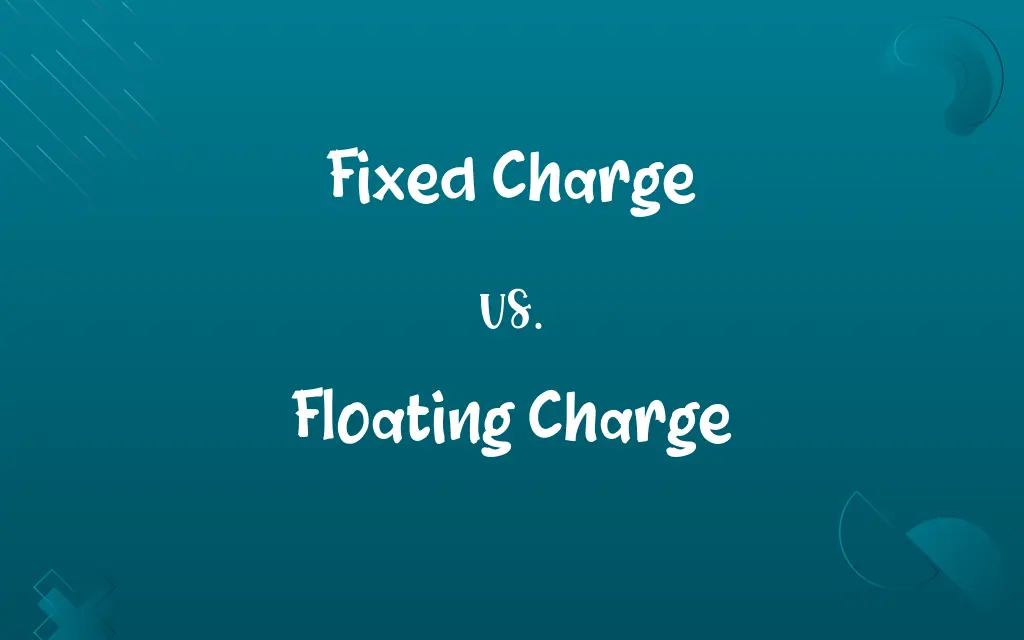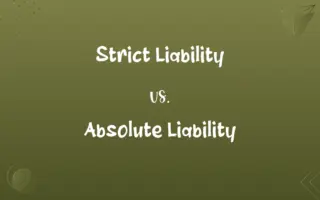Fixed Charge vs. Floating Charge: Know the Difference

By Shumaila Saeed || Published on January 23, 2024
A Fixed Charge is a security interest attached to specific assets, while a Floating Charge is a security on a group of assets that change over time, becoming 'fixed' upon a certain event.

Key Differences
A Fixed Charge is linked to specific, identifiable assets like machinery or property. In contrast, a Floating Charge applies to assets as a whole, including those acquired in the future.
Shumaila Saeed
Jan 23, 2024
Fixed Charges are on non-current, tangible assets, restricting their sale or transfer without the charge holder's consent. Floating Charges cover current assets like stock, which can be used, sold, or replaced in the normal course of business.
Shumaila Saeed
Jan 23, 2024
A Fixed Charge is created and attached to an asset from the time of its creation. A Floating Charge 'floats' over all assets and becomes 'fixed' upon a triggering event like liquidation or default.
Shumaila Saeed
Jan 23, 2024
In the event of liquidation, Fixed Charges generally have priority over Floating Charges. This means fixed charge holders are paid first from the sale of the secured asset.
Shumaila Saeed
Jan 23, 2024
Fixed Charges are suitable for assets that aren't expected to change frequently. Floating Charges are ideal for businesses with rapidly changing inventories or assets.
Shumaila Saeed
Jan 23, 2024
ADVERTISEMENT
Comparison Chart
Asset Specificity
Attached to specific, identifiable assets
Covers a group of current, changing assets
Shumaila Saeed
Jan 23, 2024
Flexibility
Restricts the sale or use of the asset
Allows normal use and sale of the assets
Shumaila Saeed
Jan 23, 2024
Nature of Assets
Typically non-current, tangible assets
Current, circulating assets
Shumaila Saeed
Jan 23, 2024
Creation and Conversion
Fixed from creation
Becomes fixed upon a specific event
Shumaila Saeed
Jan 23, 2024
Priority in Liquidation
Higher priority in repayment
Lower priority compared to fixed charges
Shumaila Saeed
Jan 23, 2024
ADVERTISEMENT
Fixed Charge and Floating Charge Definitions
Fixed Charge
It restricts sale or transfer of the asset.
Due to the fixed charge, the company couldn't sell their machinery without the lender's permission.
Shumaila Saeed
Jan 08, 2024
Floating Charge
Floating Charge is a security on a group of assets.
The retailer used a floating charge on its inventory to secure a loan.
Shumaila Saeed
Jan 08, 2024
Fixed Charge
It has priority over floating charges in liquidation.
In liquidation, the fixed charge on the property ensured early repayment to the creditor.
Shumaila Saeed
Jan 08, 2024
Floating Charge
Floating Charge becomes 'fixed' upon certain events.
The floating charge crystallized into a fixed charge when the company went into liquidation.
Shumaila Saeed
Jan 08, 2024
Fixed Charge
Fixed Charge is ideal for non-current, tangible assets.
The company's factory and land were under a fixed charge as collateral for the loan.
Shumaila Saeed
Jan 08, 2024
ADVERTISEMENT
Floating Charge
Floating Charge has lower priority in liquidation.
In the event of liquidation, the floating charge was subordinate to the fixed charges.
Shumaila Saeed
Jan 08, 2024
Fixed Charge
Fixed Charge is attached from the time of its creation.
The fixed charge was placed on the new equipment as soon as it was purchased.
Shumaila Saeed
Jan 08, 2024
Floating Charge
It allows business operations to continue normally.
Despite the floating charge, the company continued to trade and sell its stock.
Shumaila Saeed
Jan 08, 2024
Fixed Charge
Fixed Charge is a security interest on specific assets.
The company took a loan against a fixed charge on its office building.
Shumaila Saeed
Jan 08, 2024
Floating Charge
It covers assets acquired in the future.
The floating charge extended to the new stock acquired by the business.
Shumaila Saeed
Jan 08, 2024
Repeatedly Asked Queries
Can a Fixed Charge be on any asset?
A Fixed Charge is typically on tangible, non-current assets like real estate or heavy machinery.
Shumaila Saeed
Jan 23, 2024
Are Floating Charges common in business?
Yes, Floating Charges are common, especially in businesses with rapidly changing assets like retail.
Shumaila Saeed
Jan 23, 2024
What happens to a Fixed Charge if the asset is sold?
The asset under a Fixed Charge cannot be sold without the charge holder's consent.
Shumaila Saeed
Jan 23, 2024
Which has higher priority, a Fixed or Floating Charge?
A Fixed Charge generally has a higher priority over a Floating Charge in terms of repayment in liquidation.
Shumaila Saeed
Jan 23, 2024
How does a Fixed Charge affect business operations?
A Fixed Charge may restrict the business’s ability to dispose of or use the secured assets freely.
Shumaila Saeed
Jan 23, 2024
Can a Fixed Charge be transferred?
A Fixed Charge can be transferred if the loan is paid off or with the lender's consent.
Shumaila Saeed
Jan 23, 2024
What is a Fixed Charge?
A Fixed Charge is a security interest attached to specific, identifiable assets as collateral for a loan.
Shumaila Saeed
Jan 23, 2024
How does a Floating Charge become fixed?
A Floating Charge becomes fixed or 'crystallizes' upon certain events, like the company going into liquidation or default.
Shumaila Saeed
Jan 23, 2024
Can a company operate normally under a Floating Charge?
Yes, a company can operate normally under a Floating Charge, using, selling, and replacing assets.
Shumaila Saeed
Jan 23, 2024
Is a Fixed Charge suitable for fluctuating assets?
No, a Fixed Charge is not suitable for fluctuating assets; a Floating Charge is more appropriate.
Shumaila Saeed
Jan 23, 2024
What types of businesses typically use Floating Charges?
Businesses with high inventory turnover, like retail or manufacturing, often use Floating Charges.
Shumaila Saeed
Jan 23, 2024
What is a Floating Charge?
A Floating Charge is a security interest over a pool of changing assets, which becomes fixed upon a specific event like liquidation.
Shumaila Saeed
Jan 23, 2024
What is the risk for lenders with Floating Charges?
The risk for lenders with Floating Charges is the lower priority in repayment and variable asset value.
Shumaila Saeed
Jan 23, 2024
How is a Fixed Charge established?
A Fixed Charge is established through a legal agreement specifying the particular assets as security.
Shumaila Saeed
Jan 23, 2024
Do Floating Charges affect a company’s credit rating?
Floating Charges can affect a company’s credit rating depending on the size and terms of the charge.
Shumaila Saeed
Jan 23, 2024
What is the main advantage of a Fixed Charge?
The main advantage of a Fixed Charge is the higher repayment priority it provides to lenders.
Shumaila Saeed
Jan 23, 2024
Are Floating Charges secured or unsecured?
Floating Charges are considered secured, though they have lower priority compared to fixed charges.
Shumaila Saeed
Jan 23, 2024
Can a business have both Fixed and Floating Charges?
Yes, a business can have both Fixed and Floating Charges on different assets.
Shumaila Saeed
Jan 23, 2024
Can new assets be included under an existing Floating Charge?
Yes, new assets can be included under an existing Floating Charge.
Shumaila Saeed
Jan 23, 2024
How does insolvency affect a Floating Charge?
In insolvency, a Floating Charge becomes fixed and is subject to repayment after fixed charges are cleared.
Shumaila Saeed
Jan 23, 2024
Share this page
Link for your blog / website
HTML
Link to share via messenger
About Author
Written by
Shumaila SaeedShumaila Saeed, an expert content creator with 6 years of experience, specializes in distilling complex topics into easily digestible comparisons, shining a light on the nuances that both inform and educate readers with clarity and accuracy.








































































